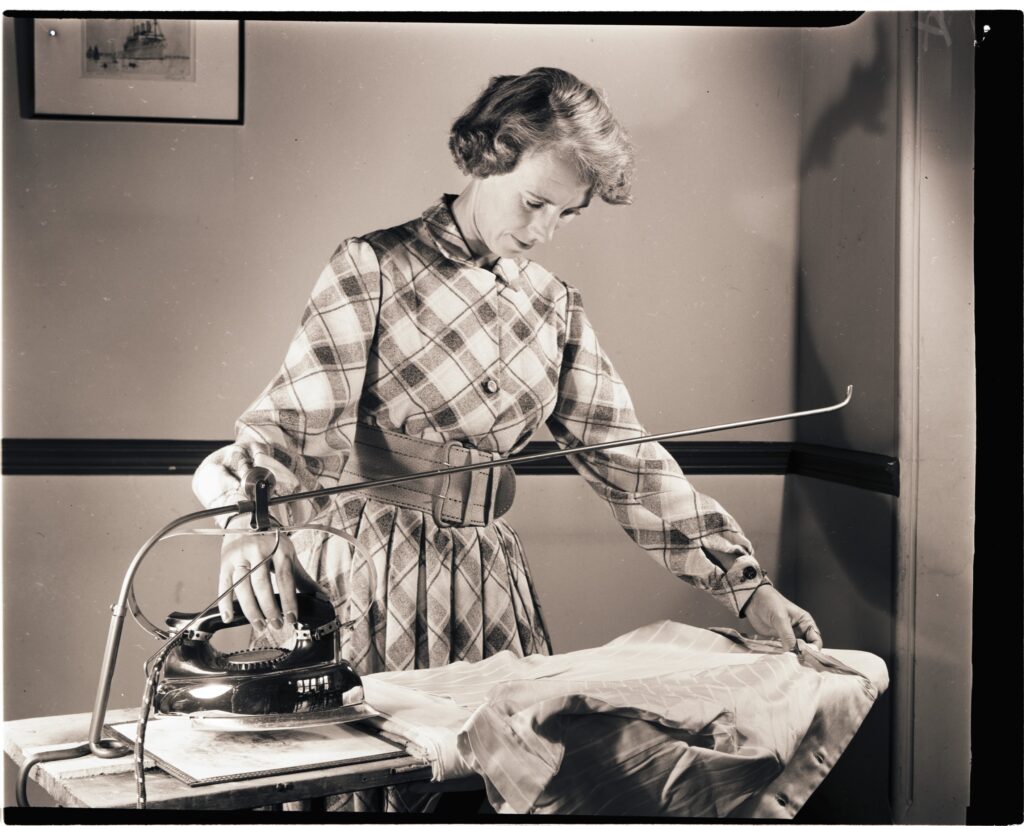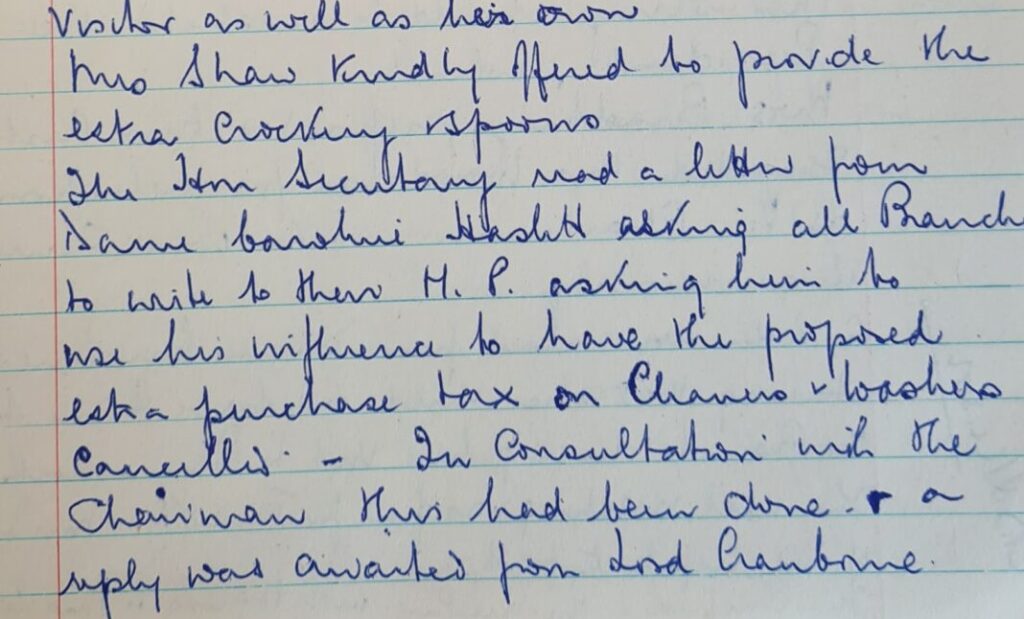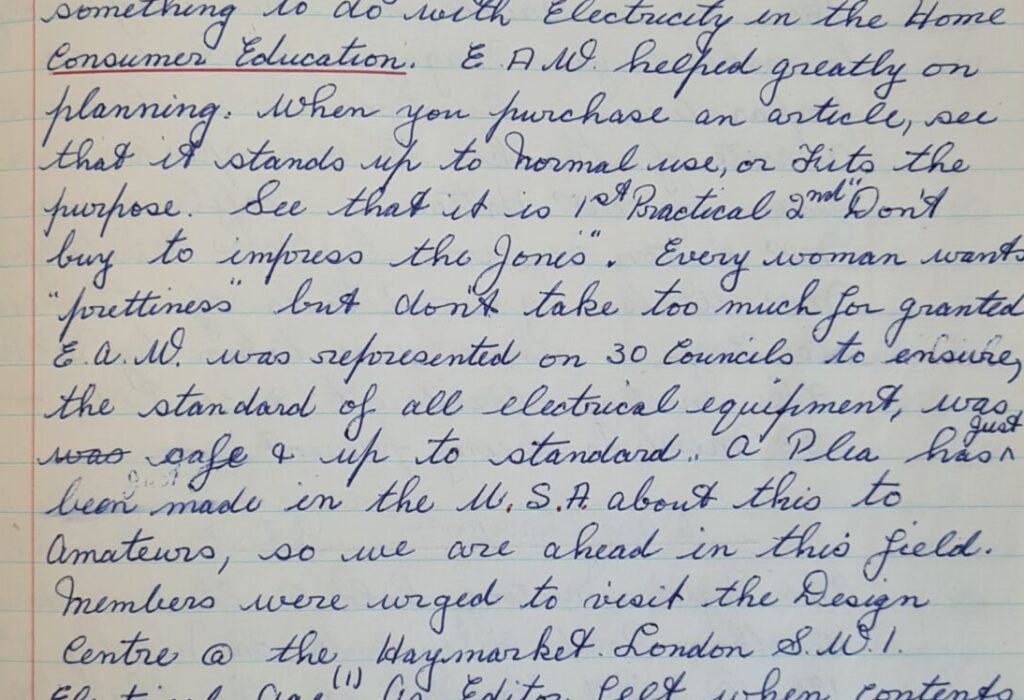In 1924 Mabel Lucy Matthews and Caroline Haslett electrical engineers and champion of women’s rights set out to popularize the domestic use of electricity. They, along with other leading female figures from the world of engineering, politics and business, established the Electrical Association for Women.
The EAW set out to educate women on the range and benefits of electrical appliances in the home with the slogan ‘emancipation from drudgery for women’ so women could pursue their ambitions beyond the home. Alongside this the association also campaigned for more electrical outlets in homes, better electrical safety and greater understanding of the potential use of electricity as a driver for social change.

There was a network of branches across Britain and abroad and records held at the Dorset History Centre represent the existence of branches in Bournemouth, Poole and South Dorset. On reading the Minutes books of these Associations one is struck by the variety of activities and opportunities that the women were involved in. Whilst membership numbers appear to fluctuate, the documents show opportunities to meet other groups from areas such as the Isle of Wight, Reading and Yeovil, as well as attending national conferences for the National Council of Women where they were invited to ‘man’ a stall. Indeed much is made of visits by Dame Caroline Haslett who set out the aims and achievements of the Association and sought their support in national campaigns. For example, in May 1951 she asked ‘all branches to write to their MPs asking him to use his influence to have the proposed extra purchase tax on Cleaners and washers cancelled.’ (D-1024/1/1/1) Competitions and awards were organized , including a certificated ‘Home Workers Course’ and leaflets and publications such as Electrical Age were distributed.

The Minute books show the groups also benefitted from support from local businesses including the Southern Electricity Board who even provided a place for the Bournemouth branch to meet -Electric House in Bournemouth. Talks using lantern slides, films and speakers covered a range of topics including:-
- The Most up to date Sewing Machines
- The Refrigerator
- Lighting of Houses Old and New
- Hotpoint Electrical Appliances
- Small Repairs in the Home and Prevention of Electrical Accidents
- Home freezing and the best use of Frozen Food
- Food Hygiene and Fire Safety
More obscure subjects included Electricity and the Frenchwoman, Impressions of an Atomic Energy Establishment, Travelways in South Africa and the Use of Copydex.

Companies also used the Association to survey female opinion, such as when identifying the most popular size of boiling plates on cookers, which turned out to be 8 inches. Perhaps the most unusual request was raised in July 1951 – ‘HQ asked members opinion on the size of women’s underwear and the Hon Secretary was asked to reply that there was a shortage of WX sizes.’ (D-1024/1/1/1) Clearly not everything discussed was to do with electricity!
The Association Branches also organized a number of social events including excursions, Christmas parties and numerous fundraising ventures ranging from whist drives to jumble sales. Indeed it has to be said that whilst the aim of the Association was to support the increased emancipation of women the vast majority of the notes and discussions during the meetings appear to centre on traditional women’s housekeeping roles such as whether to provide cakes or biscuits, who was responsible for the tea making and the organization of the Christmas dinner. An indication perhaps that the emancipation of women had some way to go!
—
If you want to learn more, you may be interested in these films available online:
The Electrical Association for Women and their All Electric House
Exploring the Archives: The Electrical Association for Women (1924)
—
This was a blog written for Dorset History Centre by volunteer Jane Ashenden.

